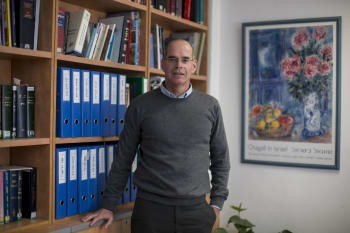Gili Melnicki, themarker.com
"2019 was a year of two election campaigns, and we only marketed 40-35,000 housing units in signed deals, and in auctions we reached about 50,000 marketed housing units - compared to an average of 70,000 units marketed in each of the last three years. It's been a difficult year," This is what Adiel Shamron, CEO of the Israel Lands Authority (PMI), said today at the Eilat Real Estate Conference.
In a panel that dealt with managing the land resource as a solution to the housing crisis, Shamron explained that "in the public, we believe that we own 93% of the land. But how many are available? Planned, private areas and local government ownership - we currently own only 7% of the state's land, about 1.59 million hectares. "
Shimron believes that apart from the urban renewal, which is a tool to meet demand in demand areas in the middle of the country - where the vacant land supply is limited, the land resource management solution is also in the clearing and streamlining of land on which there are many barriers and are in demand areas - such as bases "To and from Sde Dov Champagne these days.
"Talking in two voices." Erez Kaminitz Photo: Olivier Pitusi
"Through land reductions, we can make a lot more impact on the housing shortage as well as through optimizing land use," said Shimron. He referred to the evacuation of the IDF camps and the development of macroeconomic land for which pollution and environmental issues have arisen. "Engage in removing soil pollution barriers to permit land. In Apollonia, we purge the land in the billions and execute huge scale infrastructure projects. In Haifa Bay, we were one of the partners in the purification of the land at a total value of about NIS 1.5 billion. We financed NIS 360 million to evacuate Eilat airport. It's money we spend and come back from land marketing. We have the ability to use the funds to clear and develop land. "
When asked about the project's activity (National Committee for Planning and Building of Preferred Housing Complexes - a government program to accelerate housing supply in Israel), Shamron said that despite the harsh criticism of its aggressive activities, the planning was devoid of sufficient public sharing procedures and unsuitable for existing plans: "It gives birth to thousands of housing units not only on paper but also in practice. There are 20,000. Each Ashkelon is built on and in the IDF, every Or Yehuda is built on the IDF. Without the IDF, people will not have where to live in the country."
Erez Kaminitz, the real estate subordinate for real estate, said at the real estate conference: "I think the VP has met his need. He has room to stay when it comes to the Arab authorities and urban renewal, but the VP does not need planning on "empty" land.
 "There are some places that are effective. “Chaim Avitan Photo: Ofer and Kenin
"There are some places that are effective. “Chaim Avitan Photo: Ofer and Kenin
"TAMA is not over"
Haim Avitan, chairman of the governmental renewal authority, said in a panel that dealt with the National Planning and Building Council's decision to stop TAMA 38: Of the 38th of the plan. The plan was to be valid until May 2020. We understand the significance and importance of the plan, so we recommended not to terminate the 38th of the plan immediately but to extend it for three years - during which transitional provisions were issued, and authorities wishing to continue the plan until 2025. The TAMA is not over. In Ramle, for example, in a program submitted to the Brig. Of about 2,000 units, there are several buildings that have been marked as reinforcement in the 38th. There are several places that are effective. "
In this regard, Kaminitz commented in a parallel hearing, saying that the Justice Department is examining legal aspects of supplemental land use as an accelerator of urban regeneration processes in areas where there is insufficient economic viability, especially in the periphery . He said, "We are already waiting for a government to settle and settle the discourse and controversy that exists today, as the RPM opposes the complementary land move, and the Israel Lands Council is trying to move it. There is currently a two-voice discourse. "
During the discussion, Ayelet Rusk, CEO of a complex that deals with financing urban renewal projects, noted that about 1,500 entrepreneurs are currently building 1,800 projects worth NIS 20 billion.



